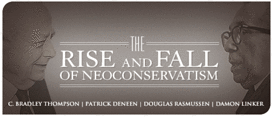Douglas Rasmussen’s response to my essay on “Neoconservatism Unmasked” doubles as a significant critique of Leo Strauss and provides an important defense of classical liberal moral theory. Rasmussen supports my interpretation and assessment of Strauss and the neocons while extending my critique by focusing on one crucially important aspect of Strauss’s thought: his criticism of modern natural-rights theory in the light of classical natural right.
According to Strauss, the modern natural-rights teaching focuses on the individual as the “center and origin of the moral world,” whereas classical natural right is concerned with man’s ends and with his duties. As I noted in Neoconservatism: An Obituary for an Idea, Strauss laments Locke’s “shift of emphasis from natural duties or obligations to natural rights.” He clearly prefers a world where “resigned gratitude and consciously obeying or imitating nature” is elevated, rather than a world where “man owes almost everything valuable to his own efforts” and where “self-reliance and creativity become henceforth the marks of human nobility.” In Strauss’s view, Locke’s natural-law teaching replaced the ancients’ and the Christians’ transcendent and intrinsic ethic of duty and self-sacrifice with a subjectively materialist and hedonist foundation that is grounded on the right to self-preservation and self-expression. Locke liberated man from the constraining bonds of nature, revelation, and the force of tradition and custom. His acquisitive bourgeois man lives an agitated but aimless life in the pursuit of property, pleasure and recreation. Strauss wondered how a regime founded on these Lockean premises could ever satisfy the highest aspirations of the human soul.
Rasmussen correctly suggests that Strauss was not only an opponent of the modern natural-rights philosophy but also wrong in his understanding of what rights are and the role they play in civil society. Rasmussen astutely notes that Strauss mischaracterized rights as “natural powers” rather than as moral principles. This is a profoundly important point. If rights are powers, then they are simply arbitrary assertions of human will and are therefore subjective. It is on this mistaken assumption that Strauss then reduces all modern thought to nihilism. Rasmussen does not and will not permit Strauss to demote the principle of rights to Hobbesian claims on behalf of the passions.
Rasmussen goes on to note (correctly in my view) that Strauss invokes several “false alternatives,” including reducing individualism and Lockean rights theory to subjectivism, amoralism, and atomism. Strauss’s goal, according to Rasmussen, is to wrench individual liberty away from “ethical knowledge and a life of morality and virtue.” Rasmussen will hear nothing of it, nor will I. In short order, Rasmussen pulls the rug out from underneath Strauss’s feet. Rasmussen (with his long-time co-author Douglas Den Uyl) indicates how the modern natural-rights teaching can be reconciled with—indeed, it must rest upon—a firm moral foundation (e.g., an Aristotelian “natural [biocentric-based] teleology”). In my view, rights make morality possible in a social context. In fact, one might very well argue that the doctrine of “rugged individualism” actually promotes social cooperation and voluntary association, while various forms of collectivism actually promote anti-social atomism.
In sum: Rasmussen’s contribution to this forum proffers a genuine contribution to the defense of a free society by exploding one of the most powerful critiques of its underlying philosophic foundations.

